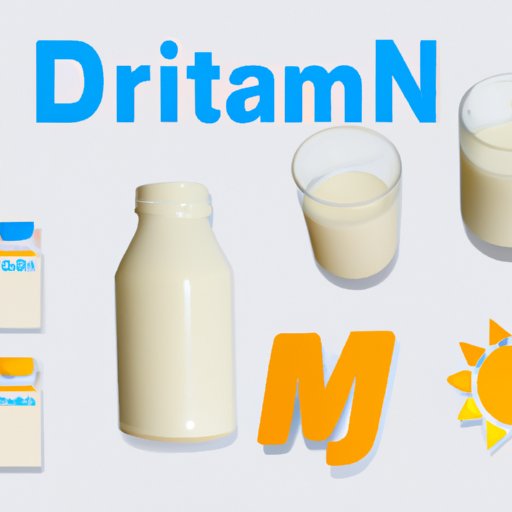
I. Introduction
Vitamin D is an essential nutrient that plays a crucial role in maintaining optimal health. This fat-soluble vitamin is primarily obtained from exposure to sunlight and certain foods, including milk. In this article, we will explore how much Vitamin D is in milk, and how milk can be a significant source of this vital nutrient.
II. The Role of Vitamin D in the Body and How Milk Can Provide a Significant Portion of the Daily Recommended Intake
Vitamin D is necessary for the absorption of calcium and phosphorus, which are crucial for building and maintaining strong bones. Additionally, Vitamin D has been linked to immune health and the prevention of chronic diseases such as cancer and heart disease.
The daily recommended intake of Vitamin D varies depending on age, with adults requiring approximately 600-800 IU per day. One cup of milk provides around 100 IU of Vitamin D, making it a significant source of this nutrient.
III. Comparison of Vitamin D Levels in Different Types of Milk, Including Dairy, Soy, and Almond Milk
There are various types of milk available on the market, including dairy, soy, and almond milk. Comparing the Vitamin D levels in these different types can help determine which is the best option for increasing Vitamin D intake.
Dairy milk is a good source of Vitamin D, with one cup providing approximately 100 IU. Soy and almond milk, however, are often fortified with Vitamin D, providing around 120 IU per cup.
When choosing which type of milk to consume to increase Vitamin D intake, it is essential to consider individual allergies and dietary preferences.
IV. The Importance of Vitamin D for Bone Health and How Milk Can Help Prevent or Slow Down the Onset of Osteoporosis
Milk is one of the best sources of calcium, a mineral required for strong bones. The addition of Vitamin D to milk has been shown to improve bone health by promoting calcium absorption and preventing osteoporosis.
Osteoporosis is a bone disease that occurs when the body loses too much bone mineral density, making bones more prone to fractures and breaks. Regular milk consumption, as part of a balanced diet, can help prevent or slow down the onset of osteoporosis.
V. The Link Between Vitamin D Deficiency and Certain Health Conditions, and How Regular Consumption of Milk Can Reduce This Risk
Vitamin D deficiency has been linked to various health conditions, including cardiovascular disease, diabetes, and certain types of cancer. Consuming milk regularly can help reduce the risk of developing these conditions by providing the body with the necessary nutrients it needs for optimal health.
Milk consumption has been shown to help manage and improve the symptoms of certain health conditions, such as diabetes and cardiovascular disease. Milk’s ability to prevent inflammation and maintain healthy blood pressure levels can significantly impact overall health.
VI. Different Ways to Incorporate More Milk Into Your Diet to Increase Vitamin D Intake
There are various easy ways to incorporate more milk into your diet to increase Vitamin D intake. One way to do this is by consuming more dairy products such as cheese and yogurt, both of which are good sources of Vitamin D. Additionally, incorporating milk into smoothies or coffee beverages is an easy way to increase Vitamin D intake.
Another way to increase Vitamin D intake is by adding fortified soy or almond milk to oatmeal or other breakfast cereals. Many brands of breakfast cereals are fortified with Vitamin D, making them an easy and convenient way to increase daily intake.
VII. Alternatives to Milk for Those Who are Lactose Intolerant or Vegan, and How to Ensure Proper Vitamin D Intake Without Consuming Dairy.
For individuals who are lactose intolerant or follow a vegan diet, dairy milk may not be an option. Fortunately, there are various dairy alternatives available that are fortified with Vitamin D, including soy, almond, and oat milk.
Mushrooms exposed to sunlight are also an excellent source of Vitamin D, and incorporating them into your diet can help ensure proper intake. Additionally, Vitamin D supplements are available over the counter, making them a convenient and effective way to increase daily intake.
VIII. Conclusion
Vitamin D is an essential nutrient that plays a crucial role in maintaining optimal health. Milk is an excellent source of Vitamin D, providing around 100 IU per cup. Incorporating dairy products and dairy alternatives fortified with Vitamin D into your diet can help increase daily intake and prevent the onset of certain health conditions.
Remember, as with any dietary change, it’s essential to speak with a healthcare professional before making any significant changes to your diet.





